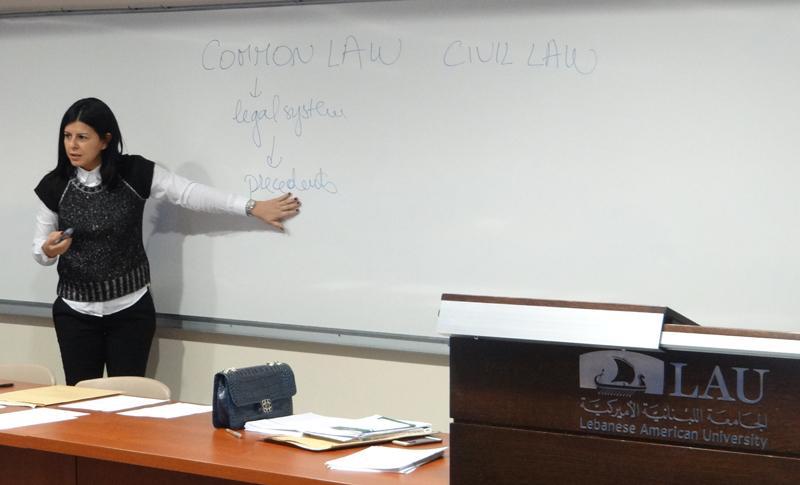Accuracy and Context in Legal Translation

When it comes to translation, legal documents require their own specialized study.
Knowing this, the Department of Humanities’ Translation Program organized a student workshop called Legal Translation in International Tribunals, focusing on translations within the Special Tribunal for Lebanon (STL) on February 20 at the Adnan Kassar School of Business in Beirut.
During the one-day workshop, Head of the Arabic Translation Unit in the Language Services Section at the STL Rita Boustani introduced students to the main differences between common and civil law and defined the legal jargon used under both. Boustani also expounded on the STL’s structure and the mechanisms legal translators use.
Program Coordinator and Associate Professor of English and Applied Linguistics Nuwar Diab said that such workshops would help introduce the attending students to terminology used at the STL and other courts. Students were also informed of a three-month internship that they could apply to, she added.
Participants, who were all translation students, were given a number of exercises and asked not to use the Internet or dictionaries.
Boustani emphasized the need for accuracy and meticulous background research in legal translation due to the sensitive nature of the documents. If a sentence in the source language appears ambiguous, she cautioned, the translator is required to preserve that vagueness as it could have been intentional on the part of the lawyer who wrote it.
She also advised students to hone their linguistic skills and to start looking for internships and work opportunities while studying. “It’s also better to work in a place where someone is reviewing their work, in order to improve,” she added.
Translation senior Aya Abi Issa, who is interested in legal and medical translation, found the workshop interesting and comprehensive. “It dealt with a lot of things; how to translate legal terms and the importance of context, because the word itself doesn’t mean anything without it,” she said.
In-depth research, stressed Boustani, is crucial to ensuring an accurate translation.
“For me, translation is 70 percent research – linguistically and context-wise,” she said. “If you have the accuracy and the right context, and the language proficiency in Arabic, you will produce an accurate translation.”
Boustani, who has been with STL for nine years, said that to succeed in such a competitive field, students must possess impeccable Arabic and should master their source language, which in this case is English. “Companies are looking for translators who can produce as clean a copy as possible with minimal supervision.”
One exercise, she said, that would help students who are interested in working with international organizations improve their skills is “side translation.”
“They can use UN general texts or more specific or technical texts. They try to translate and then compare their work with the translated texts and take notes. They should do this exercise every day, and at the end of each week they go over their work. This is what is needed in order to succeed: practice.”